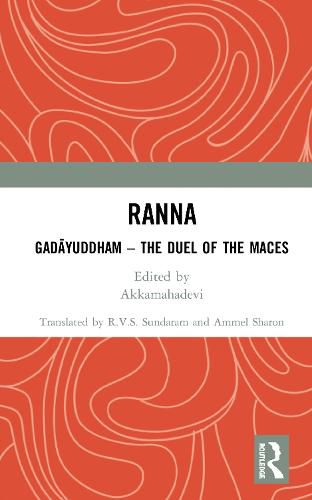Readings Newsletter
Become a Readings Member to make your shopping experience even easier.
Sign in or sign up for free!
You’re not far away from qualifying for FREE standard shipping within Australia
You’ve qualified for FREE standard shipping within Australia
The cart is loading…






The Gadayuddham (The Duel of the Maces) is a kavya (poetry) composed in classical Kannada literary style at the turn of the eleventh century. It is written in campu, a genre that developed in the tenth century as a mixture of poetry and prose. Ranna’s poem is remarkably dramatic in nature and is a meditation on the cost of war. Crisp dialogue, body gestures and imagery fill the poem. It is as if the poet were giving us directions for a play. Ranna employs ‘flashbacks’, a technique called simhavalokana, that is, a lion turning casually to glance behind him. Ranna builds up to the duel through characters recalling episodes of injury or through lamentation. The duel occupies only a short space in the eighth canto, but Ranna takes this time to fill in past episodes and reflect on the impact of war. This thousand-year-old poem will interest scholars as well as lay readers.
Please note: This title is co-published with Manohar Publishers, New Delhi. Taylor & Francis does not sell or distribute the Hardback in India, Pakistan, Nepal, Bhutan, Bangladesh and Sri Lanka
$9.00 standard shipping within Australia
FREE standard shipping within Australia for orders over $100.00
Express & International shipping calculated at checkout
Stock availability can be subject to change without notice. We recommend calling the shop or contacting our online team to check availability of low stock items. Please see our Shopping Online page for more details.
The Gadayuddham (The Duel of the Maces) is a kavya (poetry) composed in classical Kannada literary style at the turn of the eleventh century. It is written in campu, a genre that developed in the tenth century as a mixture of poetry and prose. Ranna’s poem is remarkably dramatic in nature and is a meditation on the cost of war. Crisp dialogue, body gestures and imagery fill the poem. It is as if the poet were giving us directions for a play. Ranna employs ‘flashbacks’, a technique called simhavalokana, that is, a lion turning casually to glance behind him. Ranna builds up to the duel through characters recalling episodes of injury or through lamentation. The duel occupies only a short space in the eighth canto, but Ranna takes this time to fill in past episodes and reflect on the impact of war. This thousand-year-old poem will interest scholars as well as lay readers.
Please note: This title is co-published with Manohar Publishers, New Delhi. Taylor & Francis does not sell or distribute the Hardback in India, Pakistan, Nepal, Bhutan, Bangladesh and Sri Lanka